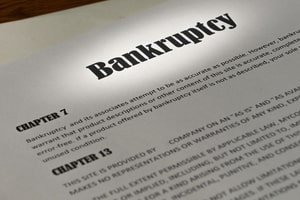Contact Our Firm
The use of the Internet or this form for communication with the firm or any individual member of the firm does not establish an attorney-client relationship. Confidential or time-sensitive information should not be sent through this form.
I have read and understand the Disclaimer and Privacy Policy.

What Types of Debts Cannot Be Eliminated Through Bankruptcy?
 Most Americans have some form of debt. This may include credit card debts, auto loans, the mortgage on a home, or other amounts owed to a creditor. For those who are able to make ongoing payments, debts can be troublesome but manageable. However, families who experience financial difficulties may end up with too much debt to handle, and this can lead to ongoing issues such as harassment from creditors, a lower credit score, or the foreclosure of a home. Fortunately, bankruptcy can provide relief for people who are in these situations, and it may allow for the elimination of certain debts. Debtors will need to understand what types of debts can and cannot be discharged.
Most Americans have some form of debt. This may include credit card debts, auto loans, the mortgage on a home, or other amounts owed to a creditor. For those who are able to make ongoing payments, debts can be troublesome but manageable. However, families who experience financial difficulties may end up with too much debt to handle, and this can lead to ongoing issues such as harassment from creditors, a lower credit score, or the foreclosure of a home. Fortunately, bankruptcy can provide relief for people who are in these situations, and it may allow for the elimination of certain debts. Debtors will need to understand what types of debts can and cannot be discharged.
Non-Dischargeable Debts
Depending on a family’s financial situation and the assets they own, Chapter 7 bankruptcy may allow for the discharge of most debts after certain assets are liquidated, or Chapter 13 bankruptcy may allow debts to be consolidated into a repayment plan, with any remaining debts being discharged after the plan has been completed. However, even after completing the bankruptcy process, a debtor may be required to repay certain debts, including:
-
Student loans - Most of the time, student loans provided through a government lender such as Sallie Mae, as well as private student loans that are backed by the federal government, cannot be discharged through bankruptcy. In some cases, a person may be able to have these loans eliminated by showing that repaying them would cause undue hardship, but few people are able to meet this requirement. Those who are unable to make student loan payments may be able to negotiate affordable repayment plans with creditors.
-
Tax debts - While there are rare situations where relief may be available for taxes owed at the federal or state level, most of these debts cannot be eliminated through bankruptcy. However, a person may be able to negotiate an offer in compromise or set up a payment plan to pay off tax debts over time.
-
Child support and alimony - A person must continue to pay financial support ordered by the court in a family law case even if they file for bankruptcy. In addition to making ongoing payments, a person will be required to pay any child support or spousal support payments that are past due.
-
Certain personal injury judgments - Damages awarded for injuries to a person or damage to their property typically cannot be eliminated if a case involved willful and malicious conduct, including injuries that were intentionally inflicted or that occurred because of recklessness, such as car accidents caused by drunk driving.
-
Fines and penalties - If a person was ordered to pay fines to the government, such as for traffic violations, or was required to pay restitution following a criminal conviction, bankruptcy cannot eliminate the requirement to pay these amounts.
Contact Our Fort Lauderdale Bankruptcy Lawyer
If you are considering bankruptcy, Elliot Legal Group can advise you of your options, and we will help you understand the options for relief from different types of debts. For skilled and experienced legal help, contact our Pompano Beach bankruptcy attorney at 754-332-2101.
Sources:
https://www.investopedia.com/ask/answers/102814/what-debt-cannot-be-discharged-when-filing-bankruptcy.asp
https://www.moneycrashers.com/types-debt-bankruptcy/















